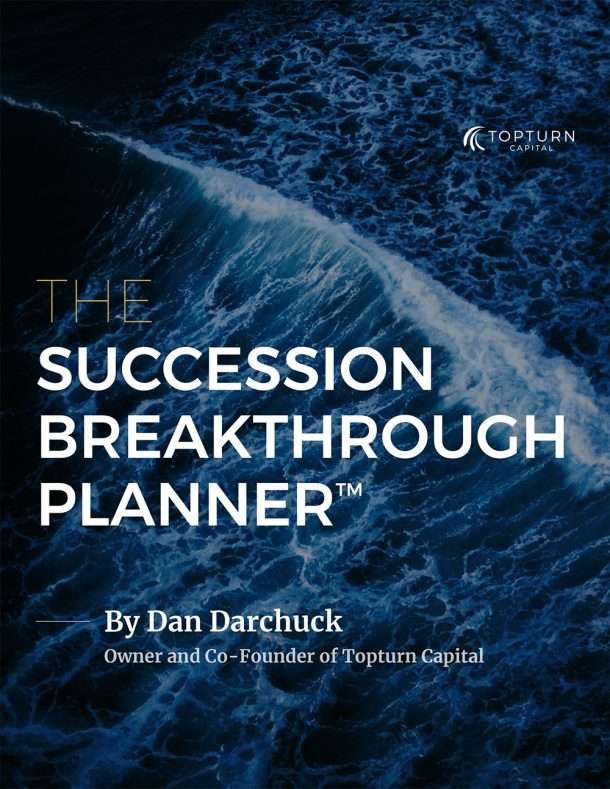It’s July 2020 and we are several months deep into a global pandemic that has impacted nearly every aspect of our lives. Whether it’s day-to-day interactions from behind a mask, with handshakes a thing of the past, processing changes in our family lives, or operating our businesses – things are different.
Many business owners have put tasks and plans on hold while we deal with these changes, and rightly so. Strategy, marketing, and staffing are frequently in flux.
What may not have changed is your desire to move forward with transitioning your business to a new regime – but has the pandemic derailed your succession plan? Bear in mind that this derailment can come in the form of the development and implementation of a plan being put on hold, and in addition, having a wrench thrown into the gears of a seemingly well-oiled plan that is already in place.
Whether it’s now or in “before times,” we’ve always advocated making the period between the decision to transition and the final paycheck, as short as possible. Emphasis on the word FINAL.
It’s common, whether the transition is to key employees, the next generation of family business owners, or even the competition, to find that the buyers don’t have all the money for a full payout right now. Invariably, after a final number has been settled upon, the new owners will come back with an offer that leaves you, the original business owner, still “on the risk” for a number of years.
How does this happen?
Usually it is in the form of a promissory note that provides a series of payouts over a period of time – often up to 10 years. The note might specify relief in times of trouble, or it may not, but it’s likely that when those times hit, you may lose some of the seeming certainty you had when you signed on.
As business owners, we often have a good sense of what our company can produce over the next 10 years, based on the last 10 years. And, even though we know that past performance is not indicative of future results, for some reason, when it comes to our company, we often believe that it is. Especially once the emotional hook of an actual succession has been set. We forget about typical business and economic cycles, we don’t count on the unexpected, and we are confident that the next 10 years will be just the same as the last.
We also forget that our business, the one we built over years, crafting it into the very sale-able asset that it is today is… in fact, an asset, like any other.
If someone came to me and said, ”Dan, I would like to buy this (house, building, etc.) from you, and I’d like you to carry a note on that purchase,” I might entertain the idea if the interest rate was attractive enough. However, I know inherently, that the longer the period of time of repayment, the greater the risk to me that the note might not be paid exactly how we’d discussed. This would make me want to really look at the length of time, any risk associated with the underlying asset itself, and the interest rate being offered. The longer the time and the greater the risk, the wider you open the door for Murphy’s Law to enter – so the total consideration has to be understood, and had better be worth it!
The pandemic is a prime example of the type of risk that many may not have accounted for in their succession plans. It’s the type of risk that we know on a high level is possible (“what can go wrong, will”… eventually), but is unlikely to have been factored into our original succession and transition plan.
Let’s say that 3 years ago, back in 2017, you decided to sell your business. Your buyers gave you 40% of the purchase price up front, and you carried a note for the 60% balance. Your buyers did all of their customary due diligence, but they did not likely count on the exponential business risk that awaited in 2020… and neither did you.
Your business was in the growth part of the industry’s business cycle back in 2017. The future looked endlessly bright. This year, however, the cycle has moved from bullish to bearish, from ultra favourable to marginal. The economic cycle changed, and now the business is struggling.
The new owners are doing everything they can to maintain staff, customers, and keep the wheels on the bus, but ultimately they come to you with financial statements in hand, and more gray hair than the last time you’d seen them.
Could you see your way clear to skipping a few payments, just until life returns to normal?
Since you know this business better than anyone else, can I ask for your help?
Would you be willing to jump back in, just to help us shore things up?
You still love this business, and you know how hard it is to go through tough times. You want this to work, and you are pretty sure you might be alright in the short term. So, you’re going to skip a few payments, and you’re going to provide some advice.
Hey, it is what many of us would do, and maybe you and the business, and the new owner will do incredibly well, navigating through this. Maybe it will all work out. But even if it does, you didn’t expect for those payments to stop, and you sure weren’t expecting to be pulled back in. And, let’s be clear, you’re not just allowing yourself to be pulled back in just because you care about the company, but also because you really want those payments to start again!
That’s the risk of a long-term buyout. It’s a risk not only to you, but also to your buyer. It’s a guaranteed relationship with the cycles of business that you may not fully realize you are taking on. It’s a worry you didn’t really need, and one you may not have fully realized you were taking on.
This is why we believe in shortening that period of time as much as humanly possible. It’s good for you, and it’s good for your buyer. It reduces the risk on both sides and gives you the opportunity to focus more fully on your next chapter, whatever that looks like for you. How we shorten that period of time is unique to each situation, but often involves finding a way to let the IRS help make some of the payments through intelligent tax strategies… and there are many available.
Transitions like these are about so much more than that final number – because, clearly, it’s not final when it takes 10 years to get to you! Thoughtful planning that considers multiple options, strategies, and ideas, can shorten that period, reduce that risk, and increase freedom for both you and the generations of business owners who follow you.
We’re actually working on a new book, provisionally titled “The Succession Breakthrough,” which discusses different high-level ways to think about succession and transition for businesses. We’ll be sharing some excerpts with you in upcoming content, to help you think through this next step in your business in the most strategic way possible.
Dan Darchuck | CEO


